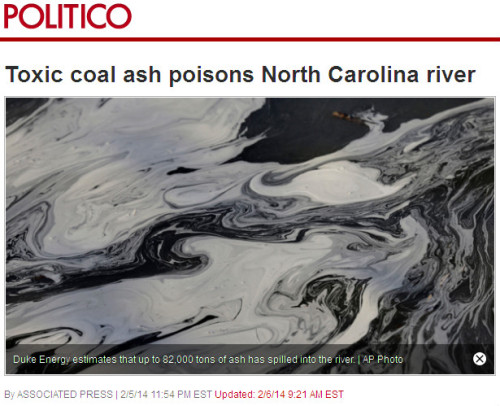Associated Press: Canoe guide Brian Williams dipped his paddle downstream from where thousands of tons of coal ash has been spewing for days into the Dan River, turning the wooden blade flat to bring up a lump of gray sludge.According to the AP, the sludge is a “witches’ brew of toxic chemicals, including lead, arsenic, mercury and radioactive uranium.” But here’s the kicker:
On the river bank, hundreds of workers at a Duke Energy power plant in North Carolina scrambled to plug a hole in a pipe at the bottom of a 27-acre pond where the toxic ash was stored.
Since the leak was first discovered by a security guard Sunday afternoon, Duke estimates up to 82,000 tons of ash mixed with 27 million gallons of contaminated water has spilled into the river. Officials at the nation’s largest electricity provider say they cannot provide a timetable for when the leak will be fully contained, though the flow has lessened significantly as the pond has emptied.
An Associated Press reporter canoed downstream of the spill at the Dan River Steam Station and saw gray sludge several inches deep, coating the river bank for more than two miles. The river had crested overnight, leaving a distinctive gray line that contrasted with the brown riverbank like a dirty ring on a bathtub.
Williams, a program manager with the Dan River Basin Association, worried that the extent of the damage might not be fully understood for years.
“How do you clean this up?” he said, shaking his head as he churned up the ash with his paddle. “Dredge the whole river bottom for miles? You can’t clean this up. It’s going to go up the food chain, from the filter feeders, to the fish, to the otters and birds, to people. Everything in the ecosystem of a river is connected.”
Environmentalists and government regulators have been warning for years that the 31 ash ponds at Duke’s power plants in North Carolina had the potential for calamity, especially after a similar pond in Kingston, Tenn., burst open in 2008.So the ponds leak chemicals into drinking water, have resulted in a previous spill, and now this disaster. But this is North Carolina, so how much do you want to bet that absolutely nothing will change as a result?
“Even without a spill, these settling ponds have been releasing continuous contamination into the rivers downstream from coal-fired power plants,” said Avner Vengosh, a professor of geochemistry at Duke University, which was named for the same family that founded the power company.
After all, going after the “job creators” for taking a big toxic crap in your drinking water would be class warfare. And we can’t have that.






